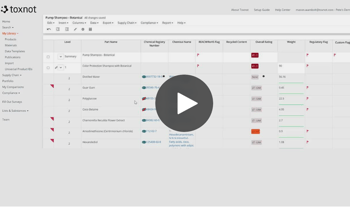The EPA has released new final rules for prohibiting use of 5 specific persistent, bioaccumulative and toxic (PBT) chemicals in products as a part of the Toxic Substances Control Act (TSCA). Many manufacturers are urgently spending money and time to survey their suppliers to meet the new requirements unless they have already received full material disclosure (FMD) from their suppliers in the past. It serves as another reminder of the clear benefits of collecting FMDs for both suppliers and manufacturers.
The New EPA Rules
Each of the 5 final rules were issued on January 6, 2021 and became effective March 8th, 2021. Each rule has various industries in scope, requirements, and exception, but two have been drawing attention due to their wide prohibitions. One rule prohibits the presence of DecaBDE with certain exemptions. DecaBDE is covered under both EU RoHS and EU REACH, so for many manufacturers they already removed it from products. However, if manufacturers have not been monitoring those regulations because they are geographically out of scope, they may have an issue. Another chemical whose rule is drawing particular attention is PIP (3:1). PIP (3:1) is not regulated by EU RoHS or any US regulations, so most companies have no knowledge of its presence in their products. In fact, manufacturers were so unprepared that the EPA has announced a “No Action Assurance” regarding the rule for PIP (3:1) for 180 days, around early September.
The Impacts to Manufacturers
This sudden change of status of chemicals caused significant problems at many US manufactures. Once compliance teams realized the impact of the legislation, they immediately began working long hours reaching out to their suppliers trying to change supplied materials. Switching materials, especially on a short timeline, can be expensive and high-risk.
Some manufacturers that have already collected full material disclosures (FMD) from their suppliers were able to do a simple search of their existing data. This helped in identifying affected chemicals and finding any materials that are still missing FMD. Having been already FMD prepared, they avoided the fire drill and all the added costs and frustrations that came with this change.
New regulations around chemicals and content will continue to appear as regulators, politicians, and consumers become savvier about the health and sustainability impacts of the chemicals in their products. If your company wants to be proactive and ready for those changes, collecting FMD is the only way to assure your products meet regulations now and in the future. If you need help with your FMD, we're here to help! Let's start a conversation on how Toxnot can help you achieve full material disclosure.
New to Full Material Disclosure?
As companies continue to face new and constantly evolving regulations, many are turning to FMD as a proactive approach to reducing supply chain risks and meeting regulatory needs. If you're new to FMD you can learn what full material disclosure is, why it's important, and what the benefits of implementation are by reading our article on how to leverage the benefits of FMD.
How Can Toxnot Help?
Watch an overview of our solutions to get an insiders look at how we can help your company streamline your FMD efforts and scale your transparency & product compliance reporting.


